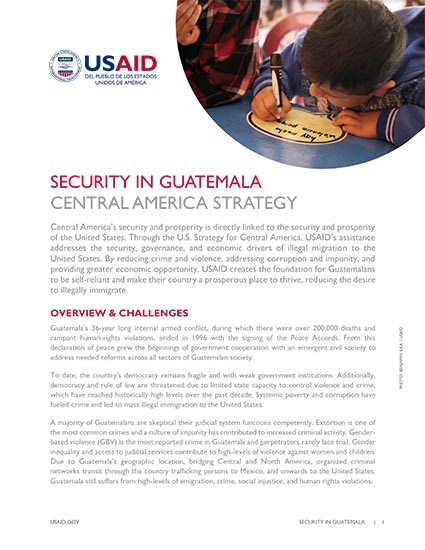Speeches Shim
Central America Strategy
High levels of crime, violence, corruption, and impunity are driving illegal migration to the United States. USAID is countering migration by helping Guatemalans make their country more secure and just.
Working closely with Guatemalan Government institutions, USAID and its partners implement a wide-range of projects to address the major security issues facing Guatemalans. To reduce illegal migration, provide citizen security, address corruption, and protect human rights, USAID’s projects complement efforts by the Government of Guatemala to: 1) reduce levels of crime and violence; 2) strengthen rule of law institutions; and 3) address root causes of insecurity.
Overview & Challenges
Since the return of democratic rule after the 1996 Peace Accords that brought a formal end to Guatemala’s 36 year Civil War, the country’s democracy remains fragile with weak government institutions. Democracy and rule of law are threatened due to limited state capacity to control violence and crime, which have reached historic levels over the past decade. Systemic poverty and corruption have fueled crime and led to mass illegal migration to the United States.
A majority of Guatemalans are skeptical their judicial system functions competently. Extortion is one of the most common crimes and a culture of impunity has contributed to increased criminal activity. Gender- based violence (GBV) is the most reported crime in Guatemala and perpetrators rarely face trial. Gender inequality and access to judicial services contribute to high-levels of violence against women and children. Due to Guatemala’s geographic location, bridging Central and North America, organized criminal networks transit through the country trafficking persons to Mexico, and onwards to the United States. Guatemala still suffers from high-levels of emigration, crime, social injustice, and human rights violations.


Comment
Make a general inquiry or suggest an improvement.